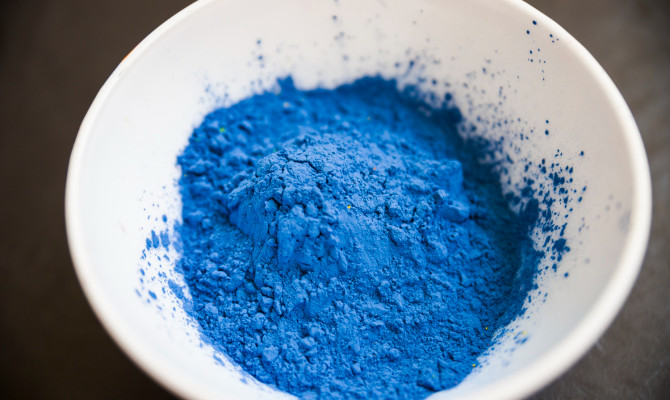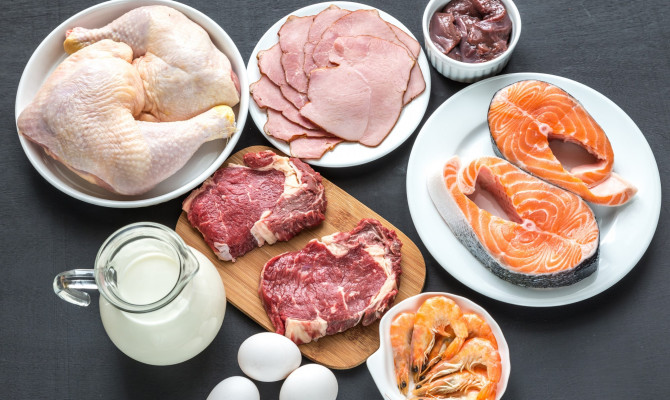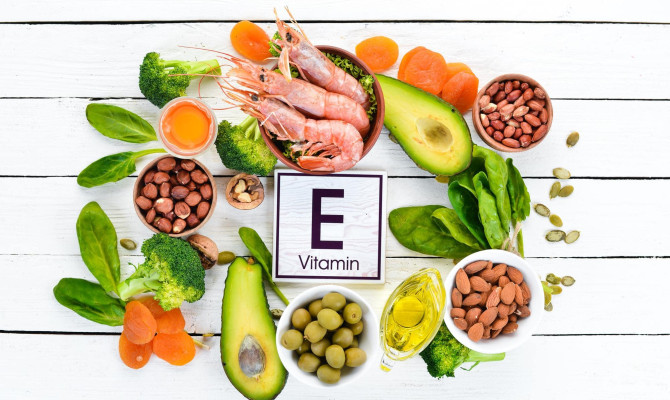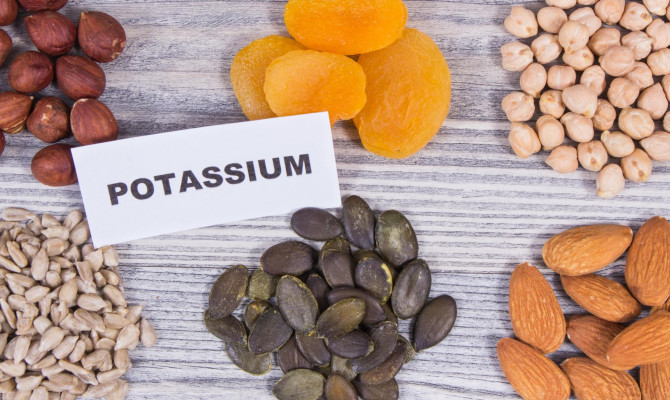Grass fed beef liver and its health benefits

- Grass fed Beef Liver
- 22 Aug 2023
Overview
What is Grass fed beef liver?
A nutrient-dense food becoming increasingly well-liked by health enthusiasts and foodies is grass fed beef liver.
It has more nutritional benefits with fewer chemicals and pollutants. This article will explain what grass-fed beef liver is, how it differs from conventionally reared meat, and if including it in your diet may have health advantages.1Overview | Researched based study from Nlm.nih.gov
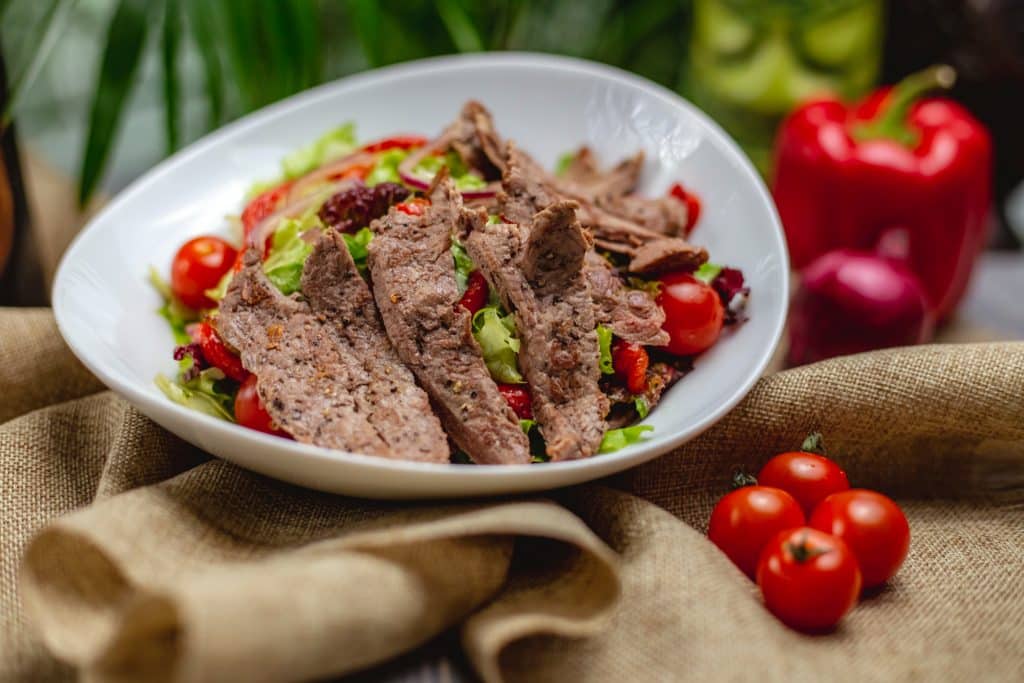
Facts
- The liver was frequently regarded as sacred in old culture and valued for its high nutritional content and therapeutic effects.
- It is a popular meal among athletes and bodybuilders because of its high vitamin density and protein content.1Overview | Researched based study from Nlm.nih.gov
- Given that it is produced in a more natural and resource-conserving manner, it can be sustainable and ecologically beneficial meat.
Benefits
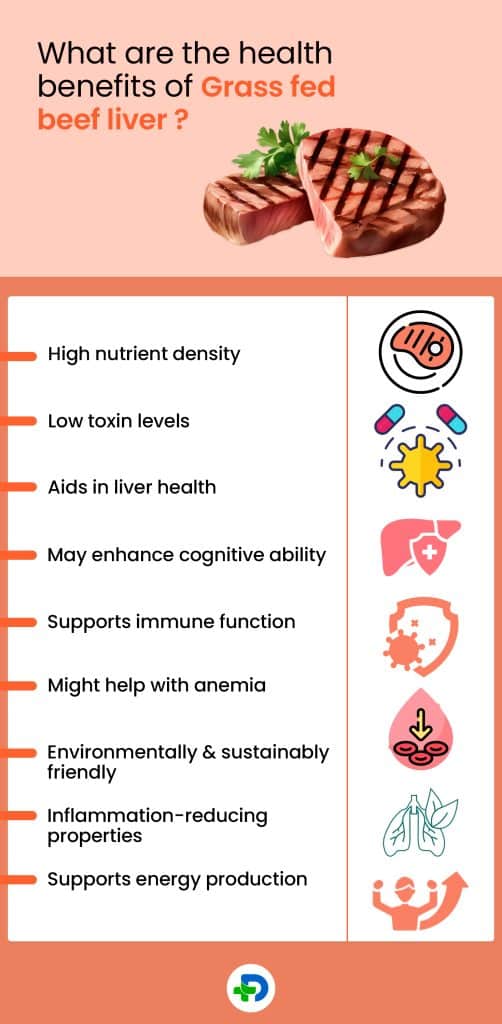
What are the health benefits of grass fed beef liver?
High nutrient density
- The liver of grass fed cattle is a meal that is incredibly nutrient-dense and rich in vitamins and minerals, including vitamins A, B12, K2, iron, zinc, and copper. These nutrients are necessary for many biological processes, including energy metabolism, immunological function, and blood health.1Benefits| Researched based study from Nlm.nih.gov
Low toxin levels
- Because the animals used to create grass fed beef liver were kept in more natural conditions, they were less likely to be exposed to contaminants like pesticides, hormones, and antibiotics.
Aids in liver health
- Choline, a vitamin that helps liver function and detoxification, may be found in grass fed cow liver.
May enhance cognitive ability
- Its high vitamin B12 content may enhance cognitive health and brain function.
Supports immune function
- It contains a lot of vitamin A, crucial for the immune system and general health.
Might help with anemia
- It is an excellent source of iron, which is necessary for the production of hemoglobin, the protein that carries oxygen in the blood. The liver contains a lot of vitamin B12, which may increase energy and lessen fatigue.2Benefits | Researched based study from Nlm.nih.gov
Environmentally and sustainably friendly
- It is produced more ecologically responsible and sustainably, which can aid in lowering carbon footprint and promoting ethical agricultural methods.
Inflammation-reducing properties
- Includes omega-3 fatty acids, which may aid in reducing inflammation in the body. Reducing chronic inflammation through food can benefit general health because it has been related to many ailments.2Benefits | Researched based study from Nlm.nih.gov
Supports energy production
- It has a lot of the B vitamins that the body needs to build energy. The use of it could support energy levels.2Benefits | Researched based study from Nlm.nih.gov
Nutritional value
Nutrition value of Grass fed beef liver
It is a very nutritious food full of important vitamins and minerals. The following important nutrients may be present in a 100-gram serving:
- Calories: 175
- Protein 25 gram
- Fat: 3-6 grams
- Carbohydrates: 3.9 grams.6Nutrition| Researched based study from Nlm.nih.gov
- Vitamin A: 16,000 IU (320% DV)
- Vitamin B12: 70.7 mcg (1,178%DV)
- Vitamin B2 (Riboflavin): 2.1 mg (123% DV)
- Vitamin B3 (Niacin): 15.6 mg (78% DV)
- Vitamin B5 (Pantothenic acid): 8.7 mg (87%DV)
- Vitamin B6 (Pyridoxine): 1 mg (50% DV)
- Folate: 260 mcg (65% DV)
- Choline: 520 mg
- Iron: 5.8 mg (32% DV)
- Copper: 12.4 mg (620% DV)
- Zinc: 4.2 mg (28% DV)6Nutrition| Researched based study from Nlm.nih.gov
Advantages
How is grass fed beef liver better than the conventional one?
Diet
- Unlike conventional beef, which comes from cattle that are given grain based diets that may contain corn and soy, natural meat comes from animals grown on a raw diet of grass and fodder.
- It often has a higher nutritional density than the conventional liver.3Advantages| Researched based study from Nlm.nih.gov
Toxins
- The amount of pollutants, such as pesticides, hormones, and antibiotics, in grass-fed cow liver, is often lower.3Advantages| Researched based study from Nlm.nih.gov
Animal welfare
- Since they are frequently reared in more humane conditions, they are seen as a more ethical meat option.
Impact on the environment
- As they are farmed more sustainably and with fewer resources than traditional beef, they are also thought to have a minor environmental impact.4Advantages| Researched based study from Nlm.nih.gov
Better taste and texture
- Contrary to normal beef liver, grass-fed beef liver is frequently thought to have better flavor and texture. This is because their diets are more diverse, which might result in more complex and tasty meat.
Overall, choosing grass-fed beef liver is healthier and more environmentally friendly. When picking your food sources, consider the nutritional advantages, moral concerns, and better flavor despite the potential cost increase.4Advantages| Researched based study from Nlm.nih.gov
Application
What are the various ways to add grass fed beef liver to your diet?
Dietary advice for incorporating grass-fed beef liver
- Try it as a paste-A traditional method to eat grass-fed beef liver is with beef liver pate. Using herbs and spices, you may create your pate at home. For a tasty snack, spread the pate on crackers or toast.
- Add it to stews or soups-In soups and stews, it can be diced and added. It will give your food a rich flavor and extra nutrients.
- Make sandwiches and hamburgers-To prepare burgers, combine ground grass-fed beef liver with ground beef.
- Stir-fry-The liver may be used to stir-fry meals after being thinly sliced. To prevent overcooking, cook the liver immediately over high heat.
- Mix it into smoothies-Smoothies may be made using it. Before combining it with your components, freeze the liver.
If you are not used to eating liver, remember that it can have a strong flavor and that you should begin with tiny portions. As you become used to the flavor, you can increase the quantity and frequency of the consumption.
Precautions
Who should avoid consuming grass-fed beef liver?
Babies
- Babies younger than six months old shouldn’t receive it. It should be carefully prepared and introduced in small doses after six months.5Precautions| Researched based study from Nlm.nih.gov
Overload disorders
- For people with iron overload diseases like hemochromatosis, it may be dangerous.
Individuals with copper toxicity
- Copper is abundant in the liver, which can be hazardous in excess for those who are copper toxic.
A liver disease
- Before ingesting it in excessive quantities, those with liver illness should speak with a doctor.
Pregnant women
- It contains a lot of vitamin A, which might be dangerous when consumed excessively during pregnancy. Before ingesting it, pregnant women should speak with a healthcare provider.5Precautions| Researched based study from Nlm.nih.gov
Dosage
Recommended dosage
The recommended consumption depends on a few factors:
- Intake varies with age, gender, and overall health.
- Adults should consume no more than 100 grams, 3-4 ounces daily.
- For teenagers, it is around 2-3 ounces per day.7Dosage| Researched based study from Nhs.uk
Side effects
Risks and possible side effects
Vitamin A toxicity
It has a lot of vitamin A, which when ingested in excess can be harmful. Symptoms consist of
- Nausea
- Vomiting
- Dizziness
- Vision changes
Copper toxicity
- Diarrhea, stomach discomfort, and digestive problems are symptoms.5Side effects| Researched based study from Nlm.nih.gov
Allergic reactions
- Beef or other animal proteins may make some individuals allergic, resulting in allergy symptoms, including hives, swelling, and breathing difficulties.
Contamination
- If not handled and prepared correctly, grass-fed liver, like other beef products, can get infected with dangerous pathogens like Salmonella or E. coli.5Side effects| Researched based study from Nlm.nih.gov
Interactions
Interaction with medicines
Drugs that thin the blood
- It contains a lot of vitamin K, which might hinder the efficiency of drugs that thin the blood, including warfarin.8Interactions| Researched based study from Nlm.nih.gov
Drugs that reduce cholesterol
- Due to its high cholesterol content, it may interact with medications like statins.10Interactions| Researched based study from Nlm.nih.gov
Methotrexate
- Cancer and autoimmune conditions are treated with it. Folic acid, included in beef liver, can interfere with this medication’s efficacy if consumed in large quantities.9Interactions| Researched based study from Nlm.nih.gov
Outlook
The bottom line
- It could be beneficial to include grass fed beef liver in one’s diet. It is an abundant source of several vital nutrients.
- It is crucial to keep in mind that, just like any other meal, it should be consumed in moderation and as part of a balanced diet.
- Additionally, use may need to be restricted or avoided by persons with specific medical problems or taking certain medications.
- Speaking with a medical expert or nutritionist for customized nutritional advice is better.
Any feedback on this article?
 This Articles content was accurate
This Articles content was accurate Very Informative Article
Very Informative Article I have a question or a comment
I have a question or a comment
 This article contains inaccurate content
This article contains inaccurate content This article was not helpful
This article was not helpful I have a question or a comment
I have a question or a comment
We appreciate your helpful feedback!
Checkout our social pages
References
-
National Library of Medicine
Nutritional Benefits from Fatty Acids in Organic and Grass-Fed Beef | Overview | benefits
-
National Library of Medicine
A review of fatty acid profiles and antioxidant content in grass-fed and grain-fed beef | Nutrition
-
National Library of Medicine
Is Grassfed Meat and Dairy Better for Human and Environmental Health? | Advantages
-
National Library of Medicine
A metabolomics comparison of plant-based meat and grass-fed meat indicates large nutritional differences despite comparable Nutrition Facts panels | Advantages
-
National Library of Medicine
Micro- and macroelement contents in the liver of farm and wild animals and the health risks involved in liver consumption | Precautions | Side effects
-
National Library of Medicine
A review of fatty acid profiles and antioxidant content in grass-fed and grain-fed beef | Nutrition
-
National Health Service
Red meat and the risk of bowel cancer | Dosage
-
National Library of Medicine
Interactions between Food and Drugs, and Nutritional Status in Renal Patients: A Narrative Review | Interactions
-
National Library of Medicine
Interaction of methotrexate metabolites with beef liver dihydrofolate reductase-I. Binary complex study | Interactions
-
National Library of Medicine
Red meat consumption and risk for dyslipidaemia and inflammation: A systematic review and meta-analysis | Interactions












